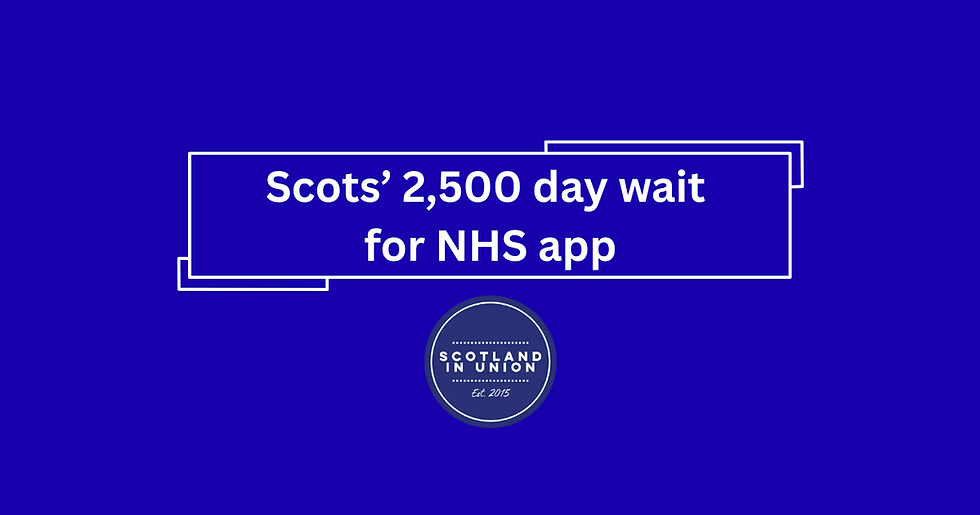NEW POLL: Scots condemn SNP’s record running public services
- Scotland in Union

- Jan 9, 2023
- 3 min read
The majority of people in Scotland think the SNP is performing poorly in its handling of vital public services, a new poll has revealed.
As MSPs return to Holyrood this week, the proportion unhappy with the government’s stewardship of the NHS, economy, education, social care, trains and ferries has risen, according to the findings.
Most people in Scotland also oppose Nicola Sturgeon’s suggestion that the next General Election should be a ‘de facto referendum’ on Scotland leaving the UK, and 59% want to remain part of the UK.
Asked what issues the SNP/Green Government should prioritise, the cost-of-living crisis was chosen by 62% of respondents – compared to only 8% who chose an independence referendum.
Barely a quarter (26%) said the Scottish Government should continue spending public money on its plan for another referendum following the recent verdict of the UK Supreme Court.
Scotland in Union has consistently used a question with a remain/leave option in polling, reflecting the Electoral Commission’s conclusion ahead of the 2016 Brexit referendum that yes/no questions should not be considered neutral as only one outcome is reflected in the question.
Respondents who said they voted ‘Yes’ in 2014 are asked why they would now vote to remain part of the United Kingdom in another referendum.
Answers in this poll included losing faith in the SNP government, the economic crisis, and dissatisfaction with Nicola Sturgeon, while other respondents simply said they had changed their mind since 2014.
The poll found:
If there was a referendum with the question 'Should Scotland remain a part of the United Kingdom or leave the United Kingdom?', 59% (-) would vote to remain part of the United Kingdom and 41% (-) would vote to leave the United Kingdom.
54% do not believe that the next General Election should be used as a ‘de facto referendum’ on Scotland leaving the UK, and 33% believe it should. (14% don’t know).
62% said the Scottish Government should stop spending public money on its plan for an independence referendum, and 26% said it should continue. (12% don’t know).
73% want the UK and Scottish governments to work together more closely.
67% believe the Scottish Government could do more with its powers to address the cost-of-living crisis, while 23% said it is doing everything possible with its powers. (9% don’t know).

Addressing powers which are devolved to the Scottish Parliament and asking ‘how well do you think the SNP is performing when it comes to the following policy areas’, the poll found:
NHS – 61% (+3) not well; 34% (-4) well.
Economy – 61% (+4) not well; 32% (-4) well.
Education – 52% (+3) not well; 39% (-4) well.
Trains – 61% (+4) not well; 28% (-3) well.
Ferries – 58% (+1) not well; 22% (+2) well.
Social care – 58% (+5) not well; 31% (-4) well.
All comparisons are with September 2022.
Pamela Nash, chief executive of Scotland in Union, said:
“This stark poll shows that the people of Scotland are deeply unhappy with the SNP’s performance running our cherished public services.
“With record waits at A&E and a crisis in GP services, the ongoing ferries scandal, a broken promise on closing the education attainment gap, and endless economic uncertainty, this must act as an urgent wake-up call for Nicola Sturgeon and her ministers as they return to Holyrood.
“It’s time for the people’s priorities in 2023; not the SNP’s priorities.
“The people of Scotland want their government to prioritise the cost-of-living crisis, the NHS, energy bills, and the economy and jobs.
“The overwhelming majority of voters want to remain part of the UK and only a third believe the next election should be a ‘de facto referendum’ on leaving the UK, demonstrating how out of touch the SNP and Greens have become.”
Topical poll conducted by Survation on behalf of Scotland in Union.
Fieldwork conducted: December 22, 2022, to January 1, 2023.
Population sampled: All residents aged 16+ living in Scotland.
Sample size: 1,025 respondents.















Incredible that posing the question as "should Scotland remain as part of UK.....?" gets such a starkly different response, presumably because it forces scales to fall from eyes.
More unionist bullshit